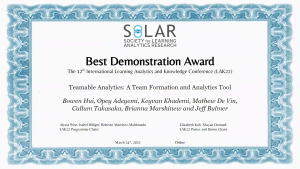
“A lot of work was involved in bringing this project to life. From the graduate student who developed the algorithm to the students who worked on the web system architecture and user interface, for this tool to come together so quickly and to such a high level of quality is incredible.”
FORMING EFFECTIVE TEAMS IS OFTEN MORE ART THAN SCIENCE, but a new tool by Dr. Bowen Hui and her team of students at UBC Okanagan is using data-driven solutions to revolutionize how instructors approach group work.
Their tool, Teamable Analytics, helps instructors create balanced teams using an AI algorithm that matches self-reported student skills and attributes against characteristics identified by the instructor. Instructors can balance students based on factors that will give them the best opportunity to achieve learning outcomes and create a positive team environment.
“I’m often asked for guidelines and advice on how to form effective teams, but the answer is different for everyone,” Hui explains. “Teamable Analytics allows instructors to decide what balance means to them in relation to their course, project requirements, or pedagogy.”
Hui has seen the value of creating balanced teams firsthand as the instructor of an interdisciplinary course that brings together students from media studies, psychology, management, engineering, and computer science backgrounds. Teamable Analytics began as part of an ALT-2040 project exploring personalized learning in interdisciplinary courses. It became quickly apparent that the tool could have benefits beyond its initial application, and Hui enlisted the help of her students to support her vision.
Though an algorithm didn’t bring their team together, Hui credits the complementary skill sets of her students with creating this remarkable tool. “A lot of work was involved in bringing this project to life. From the graduate student who developed the algorithm to the students who worked on the web system architecture and user interface, for this tool to come together so quickly and to such a high level of quality is incredible,” Hui shares. “I am so proud of all the students involved. It was their passion and dedication that made this project possible.”
 And their hard work is paying off. After a successful year that saw the team win the Best Demo Award at the International Learning Analytics and Knowledge Conference (LAK’22) and pilot their tool in seven classrooms of all sizes across UBC Vancouver and Okanagan, Hui has plans to expand their pilot project beyond UBC. “We want to continue piloting the tool to build a bigger user base and keep improving Teamable Analytics,” Hui says. “There was a lot of interest in the demo. Now we’re focusing on how we want to grow from here.”
And their hard work is paying off. After a successful year that saw the team win the Best Demo Award at the International Learning Analytics and Knowledge Conference (LAK’22) and pilot their tool in seven classrooms of all sizes across UBC Vancouver and Okanagan, Hui has plans to expand their pilot project beyond UBC. “We want to continue piloting the tool to build a bigger user base and keep improving Teamable Analytics,” Hui says. “There was a lot of interest in the demo. Now we’re focusing on how we want to grow from here.”
Hui already has some ideas about what the future might hold. “I want to provide deeper insights that will help faculty use their data from previous years to gain insights on what a balanced team means in their courses. Every year, every class is different, and it takes some trial and error to learn the best approach overall,” Hui says. “There are also opportunities to look at how Teamable Analytics can support student learning beyond academic success, such as looking at the overall health of the teams with respect to their mental health and wellness.”
Comments are closed, but trackbacks and pingbacks are open.